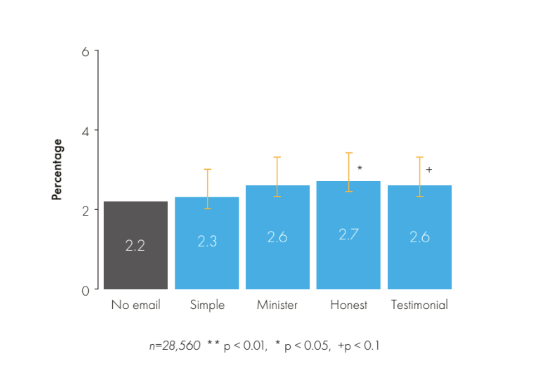Our new report, ‘Boosting businesses: applying behavioural insights to business policy’, provides a guide to policymakers on how behavioural insights can make business policy more effective.
In the long run, improving productivity is the most important way of raising the standard of living for a country’s citizens. However, in many developed countries around the world, productivity (and in turn, pay) has flat-lined since the Global Financial Crisis. The United Kingdom has lagged even further behind its peers during this time.
To design good business policy, we need to understand how people leading, managing and working in businesses really make decisions. Often, these don’t accord with the textbook theory of how firms behave. For example, the majority of managers mistakenly think their businesses are equally productive as or better than their peers. Owners also rely on rules of thumb rather than working out optional strategies when faced with a choice about their firm. And many managers of small businesses think about growth in terms of reputation, market share or employment rather than profits.
As a result of this, small changes in the design of business-oriented policies and communications can have a significant aggregate effects. For example, BIT recently partnered with Turkey’s Ministry of Trade to support businesses entering new export markets to apply for funding to boost their international presence. We designed and sent four types of emails to businesses on behalf of the Ministry. We found that an ‘honest’ message, which was upfront about the challenges involved in applying for assistance and provided a step-by-step guide on how to do this, increased submissions for export support funding by 27 per cent.
Percentage of businesses that applied for a subsidy in BIT’s trial with the Turkish Ministry of Economy

Our new report, ‘Boosting businesses: applying behavioural insights to business policy’, provides a guide to policymakers drawing out lessons from trials like this one. We’ve also released an accompanying practitioners’ toolkit which includes further guidance, tips and resources on how to improve take-up and engagement among firms.
The insights contained within the report’s first part are ‘first-generation’ behavioural interventions largely about communicating effectively with businesses. However, we believe behavioural science can and should go further than this. Beyond communication, behaviourally designed, market-wide interventions should also be part of policymakers’ toolkits. Yet we believe these receive relatively little attention in business policy at the moment.
This is something we hope to change with the report’s second part, which maps out new frontiers. In particular, we identify three areas where we think policymakers should direct their attention next:
- Addressing behaviourally-based market failures: Many markets are not working well due to behaviourally based market failures. For example, is too difficult to find information on high-quality suppliers, leaving suppliers with poor incentives to improve quality and value for money. Ironically, some of our least transparent markets are exactly those where businesses themselves are the customers.
- Improving the diffusion of knowledge and innovation across markets: A trial by academics in China found that business managers who took part in monthly meetings with other businesses to share advice saw an 8% increase in revenues a year later. Policymakers should test and evaluate how to bring peer-to-peer learning to businesses that don’t have the right connections and struggle to make the time to invest in networking.
- Incorporate behavioural insights into mainstream economic policies: Policymakers should design business incentives that go with the grain of how businesses make decisions. For example, UK R&D tax reliefs cost £3.6bn a year, but small businesses say that reliefs rarely shift their decisions over whether to invest. Policymakers should test redesigning reliefs like UK R&D tax reliefs to incorporate upfront rewards and timely prompts to encourage businesses to reinvest the proceeds of reliefs.
We are excited to share more of our work and thinking in this area. If you’d like to learn more, download the report (and practitioner’s toolkit), or please do get in touch.






